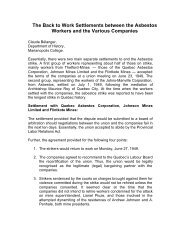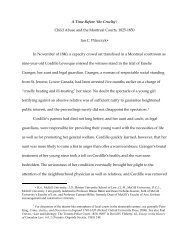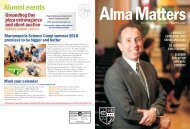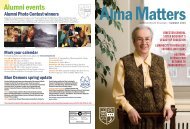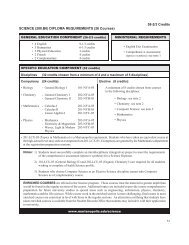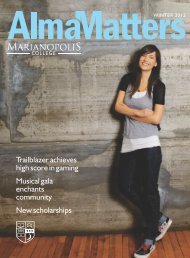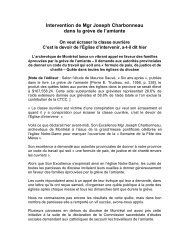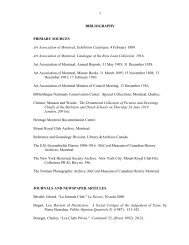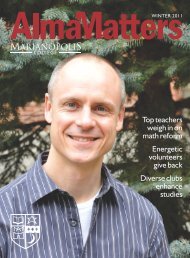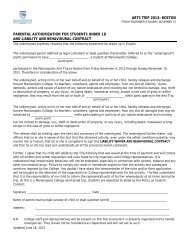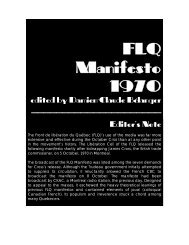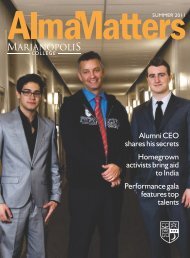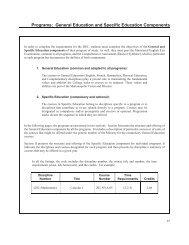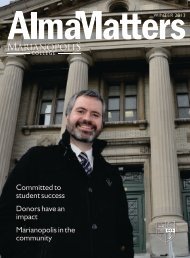General Education: Englishintended to prepare the students forthe transition to university by offeringguidance and practical experience inadvanced skills.Writing for ChildrenThe books we read as children mayremain with us all our lives. In thiscourse, students will learn to generateideas and turn them into prose thatappeals to a child audience. Thecourse introduces several genres ofchildren's writing: picture books,junior and young adult novels.Students analyze children's literatureand do short assignments focusing onliterary devices. Students produce twoedited short stories, as well as editingsheets analyzing the work of theirpeers. Students will also learn aboutthe children's literature market.JournalismThis course is an introduction to theworld of the journalist and its specialrequirements. Part of understandingthis world includes an intelligentevaluation of journalistic practicesand their effects upon society. Thecontent ranges from the straight newsstory formula and editorial writing tofeature writing and interviewingstrategies. Montreal journalists willbe invited to the class to share theirexperiences as sports writers,editorialists, and photo-journalists.ScreenwritingThis course is an introduction to thescreenwriting process, from generatingideas, to the components of filmnarrative, to the elements of visualcomposition. After studying guidesto story structure – the three-act plotstructure and Joseph Campbell’s TheHero with a Thousand Faces – theseparadigms are applied to the students’own short screenplays throughexercises in story structure, genre,characterization and dialogue. Inlearning the nine stages of screenplaydevelopment, from Character reviewthrough to the Final draft the studentsbecome familiar with Final Draft,screenwriting software and standardscreenplay formatting.Creative WritingThis course is designed for universityboundcollege students, allowingthem to develop their skills throughwriting short fiction. Through acombination of writing exercises anda consideration of texts, students willbe introduced to the use and effects ofspecific literary techniques, including:point of view, tense, significant detail,style, etc. Through writing seminars,feedback and revision, students willbe expected to develop an editorial“ear.” Beginning with exercises thataccess student’s creative process, theshort, directed assignments focus onspecific skills and conclude with acompleted short story.Creative Non-FictionThis course is designed for students todevelop their skills in writing creativenon-fiction. Focus is placed onexercises that encourage the creativeprocess, beginning with short,directed assignments and culminatingin longer, original pieces. In addition,students are introduced to the use ofspecific literary techniques anddevices that can be incorporated intotheir own work. Through the processof group writing seminars, feedbackfrom the instructor, revision, and classcritique, students learn to edit theirown work. All of these elements helpstudents find and develop their ownliterary voice.Life WritingThis is a writing course whichfocuses on non-fiction writing basedon personal experience. Through anexamination of critical theory, writingtechniques and participation in thewriting process, students explore howwe shape and remake our reality withwords. Readings include five genresof life writing: diary and journal,letters, autobiography, biography,and the personal essay.Physical Witness: Writers On TheBodyBeginning with an examination ofhow writers represent the humanbody and cultural attitudes towardsit, students explore the ways in whichthey condition and are conditioned bytheir bodily awareness. Discussed,among other topics, are the roles ofthe senses, bodies at work and play,body image and identity, dysmorphia,bodily pleasures and taboos, imaginedbodies, kinaesthetics, as well as variousauthors’ insights on mind/bodydualistic thinking.Contemporary Travel WritingThis course introduces students tothe conventions of ContemporaryTravel Writing. Bruce Chatwinand Pico Iyer are two of the mostrecognizable names in contemporarytravel writing. Chatwin laments anomadic tradition and Iyer embracesthe uncertainties of Globalization.Two fundamental questions informthe content of the course: How does acontemporary travel writer explore aworld that has already been mapped?and What politically, spiritually, andindividually motivates travel writersto embrace the open road?32
Researching Crime WritingThis course on researchingeighteenth-century crime writingwill explore the thematic treatment ofcrime in the development of variouspopular literary forms, includingballads, broadsides, engravings andcriminal biographies. All of theseforms are woven together into thefabric of the early eighteenth-centurynovel. Authors, artists and dramatistsfrom the period took their inspirationsfrom the streets. The course will alsoinvolve students doing research withhistorical documents (courttranscriptions, criminal confessionsand pamphlets) from the period.Living Sculpture Beau Brummell toLady GagaThis course seeks to understand thequintessential figure of nineteenthcenturyAestheticism: The Dandy.We will trace the genealogy of thishistorical figure from its birth in theRegency period in short essays byCaptain Jesse, Carlyle, Hazlitt, andBaudelaire; its Decadent transformationin the late nineteenth centuryin the literary and critical works ofBeerbohm, Barbey d’Aurevilly,Wilde, and Huysmans; to its current,postmodern incarnation in conceptualart and pop culture in the visualpractices of contemporary artistssuch as Yinka Shonibare, Gilbert &George, Andy Warhol, and LadyGaga.Shakespeare over TimeShakespeare’s plays have beeninterpreted around the globe in amultitude of ways in the latetwentieth- and early twenty-firstcenturies. Students in this course willconsider what happens to themeaning-making potential ofShakespeare’s drama once it isdisplaced from the culturalpreoccupations of its originalhistorical moment and then resituatedwithin a variety of recent critical andperformative contexts. Beforeexploring the challenges ofinterpreting Shakespeare’s fourhundred year old language accordingto the concerns of today’s world,students will first acquire a generalunderstanding of his drama’ssignificance in its own time.Power of RepresentationThis course focuses on literature thatdemonstrates a keen awareness of thepower stories have to shape publicperception and – by extension –public opinion, attitudes and beliefs.The primary texts studied in thecourse – both comics and prose –demonstrate this awareness not onlyin their own exploration and representationof social, political and culturalissues, but also in the ways theyparody, refer and allude to narrativesfrom literature, popular culture andhistory that have participated indefining these issues in the past.Legal IssuesStudents are introduced to differentareas of law: criminal, constitutional,contracts, negligence, family law andemployment law. Students learn toidentify and analyze legal issues anduse effective techniques of persuasionto argue different sides in hypotheticallegal cases. After careful study of oneof the above legal issues under theguidance of the instructor, studentscan choose other issues from thereading list and prepare a group oralpresentation in which they present therelevant sides of a hypothetical legalcase based on the legal issue. Studentsdevelop and practice skills of oral andwritten persuasion in their assignmentsand in each class.General Education: EnglishSocial IssuesThis course designed in its goals andstandards for second-year, universityboundstudents reinforces criticalreading, writing, and communicationskills. Students are expected to bemore autonomous in generating ideasfor discussion and contribute toclassroom learning by organizing andparticipating in seminars usingliterature as the focus. Since thefictions deal with social issues, animportant outcome should be anawareness of social problems. Thereading will be diverse spanning timeto show that the concerns in societyare mirrored in literature in literarythemes and plots.Literature and TheoryThe objective of this course is toenable students to develop greatercritical ability in approachingliterature from various perspectives.Students will study a range of criticalapproaches and learn to apply them toselected literary works. Approachesdiscussed may include New Criticism,Reader Response Theory, PsychoanalyticCriticism, Eco-Criticism,Post-colonial Criticism, GenderStudies, Feminism, Queer Theory,Marxism, and New Historicism.Students will refine their criticalthinking and oral skills in the designand management of their seminars.They will learn to lead discussion, toframe questions and express informedopinions.Critical Approaches to MythologyIn this course, we will draw upon theconventions of several critical andtheoretical lenses in order to sharpenour critical reading of major imagesand themes in world mythology. Wewill begin, through both reading anddiscussion, by exploring the traditional33
- Page 2 and 3: VISIONMarianopolis College, drawing
- Page 4 and 5: GENERAL INFORMATION: Introduction t
- Page 6 and 7: AdmissionsOUT-OF-PROVINCEAPPLICANTS
- Page 8 and 9: Financial Information• Birks Fami
- Page 10 and 11: Financial InformationConfirmation F
- Page 12 and 13: Academic Information• Failure (EC
- Page 14 and 15: Academic InformationThose who are a
- Page 16 and 17: Rules and Regulationsand whether su
- Page 18 and 19: EDUCATIONAL RESOURCES & SERVICESAss
- Page 20 and 21: Educational Resources and ServicesS
- Page 22 and 23: CHOOSING A PROGRAMDiploma Programs
- Page 24 and 25: CertificatesSpecial InterestCertifi
- Page 26 and 27: Programs: General Education and Spe
- Page 28 and 29: General EducationGENERAL EDUCATION
- Page 30 and 31: General Education: Englishidentifyi
- Page 32 and 33: General Education: Englishas the fi
- Page 36 and 37: General Education: Frenchand curren
- Page 38 and 39: General Education: Frenchce cours t
- Page 40 and 41: General Education: HumanitiesHumani
- Page 42 and 43: General Education: Humanitiesunders
- Page 44 and 45: General Education: Humanitiespracti
- Page 46 and 47: General Education: Humanitiespracti
- Page 48 and 49: General Education: Physical Educati
- Page 50 and 51: General Education: ComplementaryCom
- Page 52 and 53: General Education: ComplementaryMod
- Page 54 and 55: SECTSpecificEducation Component- Sc
- Page 56 and 57: Science: Biology - ChemistryBiology
- Page 58 and 59: Science: Mathematics - PhysicsR and
- Page 60 and 61: 56-2/3 to 58 CreditsSOCIAL SCIENCE
- Page 62 and 63: Social Science: Profiles - General
- Page 64 and 65: Social Science: Psychology ProfileE
- Page 66 and 67: Social Science: Law, Society and Ju
- Page 68 and 69: Social Science: Honours CommerceHon
- Page 70 and 71: Social Science: Anthropology - Biol
- Page 72 and 73: Social Science: History - Mathemati
- Page 74 and 75: Social Science: Political Sciencedi
- Page 76 and 77: Social Science: Religion - Sociolog
- Page 78 and 79: 54-2/3 CreditsCREATIVE ARTS, LITERA
- Page 80 and 81: Creative Arts, Literature and Langu
- Page 82 and 83: Creative Arts, Literature and Langu
- Page 84 and 85:
Creative Arts, Literature and Langu
- Page 86 and 87:
Creative Arts, Literature and Langu
- Page 88 and 89:
Creative Arts, Literature and Langu
- Page 90 and 91:
Creative Arts, Literature and Langu
- Page 92 and 93:
58-2/3 CreditsMUSIC (501.A0) DIPLOM
- Page 94 and 95:
MusicEar Training and Theory IV551-
- Page 96 and 97:
59-1/3 CreditsARTS AND SCIENCES (70
- Page 98 and 99:
Arts and Sciences: English - Humani
- Page 100 and 101:
Arts and Sciences: Art History - Ar
- Page 102 and 103:
Arts and Sciences: Mathematics - Mu
- Page 104 and 105:
Arts and Sciences: Multidisciplinar
- Page 106 and 107:
56-2/3 to 58 CreditsLIBERAL ARTS (7
- Page 108 and 109:
Liberal Artsof evolution; the first
- Page 110 and 111:
Liberal ArtsOptionalIn addition to
- Page 112 and 113:
Teaching FacultyFLEISCHER, George T
- Page 114 and 115:
Teaching FacultyTRILLER, Bernice Sh
- Page 116:
INDEX II: Programs and CoursesGener



